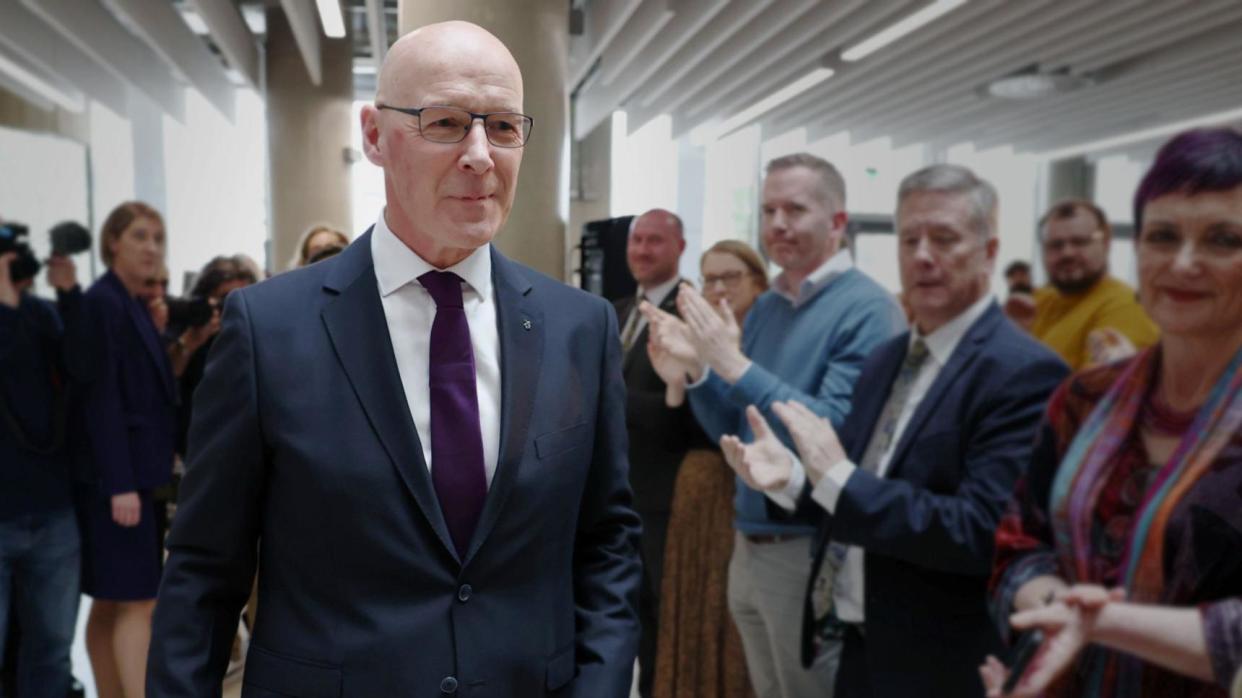New SNP leader Swinney vows fresh chapter for party

- Oops!Something went wrong.Please try again later.
- Oops!Something went wrong.Please try again later.
John Swinney has vowed a "new chapter" in the SNP's history after being confirmed as party leader.
The former deputy first minister, who is expected to be nominated by MSPs as first minister as early as Tuesday, also pledged to find “common ground” with his political opponents.
A leadership contest was avoided after a veteran SNP activist withdrew a rival bid following talks with Mr Swinney.
Current first minister Humza Yousaf - who announced his resignation last week - is expected to formally step down on Tuesday.
In a speech in Glasgow, Mr Swinney, 60, admitted his party had been through a "rough time".
He told supporters: "Today is the beginning of a new chapter in our party’s history - a chapter that will be about uniting, coming together and dedicating ourselves the service of Scotland."
Mr Swinney, who previously led the SNP between 2000 and 2004, said he envisaged a country where "people have good jobs, the climate is protected, the vulnerable are lifted up and opportunity is available for all”.
He said that politics was in the “worst state” of his career and that he had personally played a role in polarisation.
But he vowed that if selected as first minister he would attempt to bridge divides and seek “common ground” with opposition parties.
Mr Swinney added: “I will always seek, with respect and courtesy, to persuade people of the case for independence.
"All I ask of those that oppose that vision, is that they also act with the same courtesy and respect.
“That means independence is not a reason for them to refuse to work with us to build the economy, support jobs and improve the health service.”
He said he did not intend to reinstate the power-sharing Bute House Agreement with the Scottish Greens – the termination of which led to Mr Yousaf’s resignation – and would aim to lead a “moderate centre-left” minority government.
Mr Swinney said his priority as first minister, if selected, would be to eradicate the “curse” of child poverty.
He said Mr Yousaf had “conducted himself throughout the last year with grace and with dignity in some acutely difficult circumstances”, citing his leadership during the Gaza crisis.
Mr Swinney, who last year stepped down from government after 16 years in SNP cabinets, said he was “physically and mentally rested” and ready for the challenge ahead.
The confirmation of the new leader came after SNP activist, Graeme McCormick, announced at the weekend that he had enough nominations to challenge for the leadership.
But he pulled out of the contest on Sunday evening following a “lengthy and fruitful conversation” with Mr Swinney.
Last week potential leadership rival Kate Forbes - who served as finance secretary under Nicola Sturgeon - confirmed she would not stand.
She backed Mr Swinney after he promised her a "significant" role in his government.

How is a first minister appointed?
After Humza Yousaf's resignation as first minister is accepted by the King, parliament has 28 days to nominate a replacement.
When Mr Yousaf was nominated last year, Tory leader Douglas Ross, Labour leader Anas Sarwar and Lib Dem leader Alex Cole-Hamilton unsuccessfully ran against him.
If others decide to stand this time, Mr Swinney would need a simple majority of votes to win - meaning more than all other candidates combined.
If no-one reaches this threshold, the candidate with the fewest votes is eliminated. This process is repeated until there are only two candidates left.
At this point, Mr Swinney only has to win more votes than his last opponent.
The SNP has 63 seats in the parliament - which is short of a majority.
However, Mr Swinney is still expected to win the nomination with Green MSPs likely to either back him or abstain.
Holyrood's presiding officer recommends to the King that the winner is appointed as first minister.
A swearing-in ceremony at the Court of Session in Edinburgh could take place as early as Wednesday.

Mr Yousaf's premiership imploded last week after he ripped up the government's power-sharing Bute House Agreement with the Scottish Greens.
That left the SNP administration with a minority in parliament.
Facing motions of no confidence in him and his government, Mr Yousaf confirmed he was standing down last Monday.
In his resignation speech, he said he had “clearly underestimated” the hurt he had caused the Greens by ending the agreement.
Mr Yousaf congratulated Mr Swinney and urged the SNP to come together to back its new leader.
He said: “It’s now important, more than ever, that we unite so we can take our message of independence to every single doorstep in Scotland.”
SNP 'stitch-up'
In response the leadership confirmation, Scottish Tory leader Douglas Ross told BBC Scotland News: “John Swinney’s own campaign slogan was uniting for independence. I think the focus has to be on improving our public services, on growing our economy, on creating more jobs here in Scotland.”
Scottish Labour leader Anas Sarwar called for an election.
“I think this is someone that has come in with a pretence of stability and competence but under the bonnet this is still a chaotic and divided and dysfunctional political party with a record of failure," he told BBC Scotland News.
“I think people from outside will look at this and think it’s a stitch-up, it’s a coronation when actually it should be the people to choose who runs our country.”
Patrick Harvie, co-leader of the Scottish Greens, said: “Mr Swinney knows that if he is to have our support then it must be on the basis of progressive policies that help us to tackle the climate crisis and build a fairer and more equal future.”

